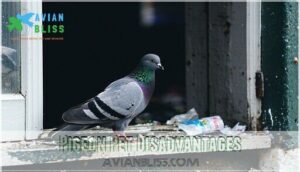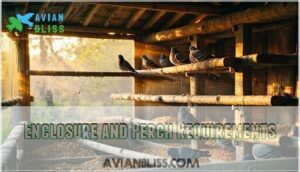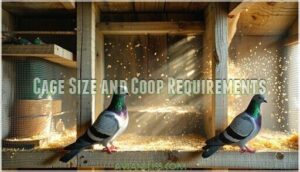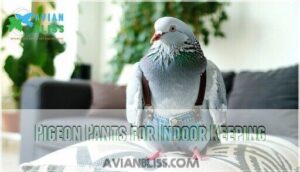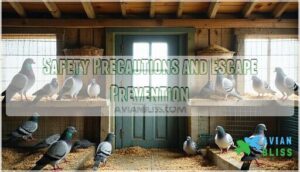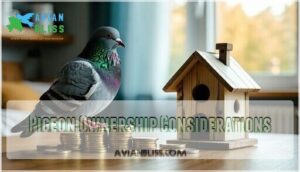This site is supported by our readers. We may earn a commission, at no cost to you, if you purchase through links.
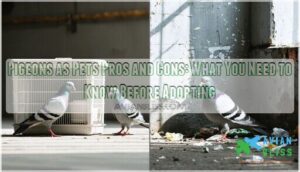 Considering pigeons as pets pros and cons reveals fascinating insights into these intelligent birds.
Considering pigeons as pets pros and cons reveals fascinating insights into these intelligent birds.
You’ll find pigeons are remarkably calm and gentle companions with impressive problem-solving abilities and 15+ year lifespans in captivity.
They’re relatively affordable and surprisingly hardy.
However, you’re dealing with significant health risks from disease transmission, constant droppings requiring daily cleanup, and limited interactive potential compared to parrots.
Their strong homing instincts mean escape risks, and many municipalities restrict urban pigeon keeping.
While they won’t squawk at dawn like roosters, they’ll test your commitment to hygiene and safety protocols that go far beyond typical pet care requirements.
Table Of Contents
- Key Takeaways
- Pigeon Pet Advantages
- Pigeon Pet Disadvantages
- Pigeon Care Essentials
- Pigeon Housing Options
- Pigeon Ownership Considerations
- Frequently Asked Questions (FAQs)
- What are the disadvantages of pigeons?
- Do pigeons make good house pets?
- Will a pet pigeon fly away?
- Are pigeons messy pets?
- What is the lifespan of a pet pigeon?
- Are pet pigeons messy?
- Do pigeons like to be petted?
- Are pigeons suitable pets for young children at home?
- Can I raise a single pigeon or do they require pairs?
- How long does a pigeon take to get comfortable with you?
- Conclusion
Key Takeaways
- You’ll love pigeons’ gentle, quiet nature and impressive intelligence, but you’ll need to commit to daily droppings cleanup and strict hygiene protocols to prevent disease transmission.
- They’re surprisingly affordable pets with 15+ year lifespans, though you’ll face limited cuddling opportunities since they prefer independence over constant human interaction.
- Their strong homing instincts mean escape risks require secure housing, and many cities have legal restrictions on keeping pigeons as pets.
- You’ll need specialized avian veterinary care and must be prepared for respiratory irritation from feather dust, making them unsuitable for people with compromised immune systems.
Pigeon Pet Advantages
You’ll find that pigeons offer several compelling advantages as companion animals that many pet owners overlook.
These domesticated birds combine intelligence with gentle temperaments, making them surprisingly suitable for home environments.
Quiet and Gentle Nature
Unlike noisy parrots or squawking birds, pigeons offer quiet companions with their gentle souls and calming presence.
Their naturally docile temperament creates a soothing environment that reduces household stress levels substantially.
These soft-feathered birds rarely create disruptive sounds, making peaceful coexistence possible in apartments or shared spaces with a calming presence.
Friendly Temperament
Pigeons demonstrate remarkable social behavior that makes them exceptional companion animals.
Their gentle nature creates a calming presence in homes, offering emotional support similar to therapy animals.
These affectionate birds bond deeply with their human caregivers, displaying genuine attachment and recognition.
Their friendly pigeon temperament allows for meaningful interactions without aggression, making them ideal for families seeking low-maintenance pets with genuine emotional connections, which can be attributed to their gentle nature and ability to form emotional connections.
Relatively Affordable
Most pigeon breeds won’t break your bank compared to exotic pet birds.
Your wallet stays happy with these budget-friendly companions that deliver big personality without premium pricing.
Here’s what makes pigeons affordable:
- Initial Cost: Purchase prices range from $10-50 per bird versus hundreds for parrots
- Ongoing Fees: Basic seed diets cost under $20 monthly with minimal vet expenses
- Affordable Housing: Simple coops work well – no expensive specialized equipment needed
These low maintenance birds offer excellent value for pet owners seeking companionship without financial strain.
Extremely Intelligent
Beyond affordability, you’ll discover remarkable cognitive abilities that rival many traditional pets.
Research demonstrates pigeons possess sophisticated problem solving skills and memory capacity that surpasses expectations.
Pigeons routinely outperform expectations with their remarkable cognitive abilities and memory prowess.
Their learning patterns adapt quickly to new environments and routines.
| Cognitive Ability | Pigeon Performance | Comparison |
|---|---|---|
| Pattern Recognition | Identify complex sequences | Matches primate studies |
| Memory Retention | Remember locations 5+ years | Superior to most birds |
| Problem Solving | Navigate multi-step puzzles | Comparable to dolphins |
| Visual Processing | Distinguish 1,800+ images | Exceeds human capacity |
These intelligent behaviors make pigeons engaging companions.
You’ll witness their ability to recognize your face, learn daily schedules, and even master simple tricks.
Their cognitive abilities transform routine care into interactive experiences, proving pigeon intelligence extends far beyond basic survival instincts.
Hardy and Adaptable
Your feathered friends won’t crumble under pressure. These birds showcase remarkable climate tolerance, thriving in scorching summers and freezing winters alike.
Their urban survival skills mean they’ll adapt to your home environment effortlessly. Unlike delicate exotic birds, pigeons possess robust constitutions that handle temperature fluctuations and dietary changes without missing a beat.
This hardy nature makes them perfect low-maintenance companions. Understanding the reasons for a pigeon not flying is essential for providing proper care and support.
Pigeon Pet Disadvantages
While pigeons can make rewarding companions, you’ll need to weigh several significant challenges before bringing one home.
These birds come with health risks, maintenance demands, and behavioral limitations that require careful planning and commitment.
Disease Carriers
Many zoonotic organisms threaten your health when keeping pigeons.
Pigeon diseases include psittacosis, salmonella, and cryptococcus fungus from droppings.
Bird flu and airborne pathogens spread through dust particles.
Feather mites and pigeon parasites cause skin irritation.
Health risks increase for immunocompromised individuals, pregnant women, and children exposed to these pigeon health issues and pigeon common diseases.
Frequent Pooping
Constant defecation creates ongoing sanitation challenges for pigeon owners.
These birds produce droppings every 15-20 minutes, requiring dedicated poop cleanup routines and dropping control measures.
Without proper waste management systems, health risks from accumulated droppings increase substantially.
Indoor pigeon care tips include installing easy-clean surfaces and establishing daily sanitation protocols to manage this persistent mess issue effectively, which involves proper waste management.
Shorter Lifespan
Pet pigeons typically live just 10-15 years, substantially shorter than most companion birds.
Your feathered friends won’t be with you as long as you’d hope.
While parrots often exceed 30-50 years, pigeon longevity rarely surpasses 20 years even with excellent pigeon care.
Aging factors, genetic limits, and health issues contribute to higher mortality rates.
This shortened life expectancy means you’ll face earlier goodbyes compared to longer-lived species.
Understanding the pigeon lifespan factors can help owners provide better care for their pets, considering the impact of aging factors and genetic limits.
Limited Interaction
Unlike some pets, pigeons won’t cuddle on your lap or seek constant affection. Their independent nature creates emotional distance that may disappoint those wanting interactive companionship.
- Limited handling tolerance compared to traditional pet birds
- Minimal bonding opportunities due to natural wariness
- Reduced engagement in play or training activities
- Solitary confinement preferences over human interaction
- Detached ownership experience despite pigeon advantages, which can lead to a sense of emotional distance and a detached ownership experience.
Potential for Nuisance
Several pigeon disadvantages can create genuine headaches for unprepared owners.
You’ll face droppings management challenges, potential property damage, and possible legal restrictions depending on your location.
| Nuisance Type | Impact Level | Management Strategy |
|---|---|---|
| Excessive Droppings | High | Daily cleaning, pigeon pants indoors |
| Noise Levels | Moderate | Soundproofing, outdoor housing |
| Property Damage | Variable | Protective coverings, regular maintenance |
| Attracting Pests | Low-Moderate | Proper food storage, cleanliness |
| Legal Restrictions | Variable | Check local ordinances first |
Pigeon Care Essentials
Once you’ve decided to keep pigeons as pets, you’ll need to master the basics of proper care to guarantee their health and happiness.
From creating the right living environment to establishing daily care routines, these essentials will set both you and your feathered friends up for success.
Enclosure and Perch Requirements
Your pigeon housing needs proper planning for their health and comfort. Choose enclosures measuring at least 4x4x6 feet per bird pair. Natural wood perch materials work best, avoiding metal that gets too hot or cold.
Indoor safety requires escape-proof latches and adequate ventilation. Outdoor protection means predator-proof mesh and weatherproof roosting areas.
A proper setup needs a quality pigeon supplies for serious enthusiasts. Consider a dedicated pigeon loft for them.
Diet and Nutrition Needs
Feeding your pigeon properly isn’t rocket science, but it’s the cornerstone of their health. A balanced pigeon diet combines commercial pellets, seed mixes, fresh vegetables, and controlled portions to prevent nutritional deficiencies.
Their diet should be formulated to meet NRC requirements for ideal health.
- Quality seed mixes with corn, wheat, and peas provide essential energy
- Grit requirements aid digestion – offer small amounts of insoluble grit weekly
- Water quality matters – change fresh water daily to prevent bacterial growth
- Supplementation needs include calcium blocks for breeding birds and vitamin support
Establish feeding schedules twice daily, removing uneaten food promptly to maintain pigeon health and proper pigeon nutrition.
Health and Hygiene Practices
Your pigeon’s health hinges on preventive care and daily hygiene routines.
Disease Prevention starts with vaccination against paramyxovirus, reducing outbreak risk by 90%.
Parasite Control requires regular screening and treatment.
Bathing Frequency should be weekly to reduce lice by 30%.
Coop Sanitation involves daily cleaning and disinfection.
Vet Checkups twice yearly catch asymptomatic diseases early.
Proper hygiene also includes removing droppings immediately to minimize bacterial buildup.
| Health Practice | Frequency | Benefit |
|---|---|---|
| Vaccination | Annual | 90% outbreak reduction |
| Fecal exams | Bi-annual | Detects parasites in 18% |
| Weight monitoring | Weekly | Early illness detection |
| Enclosure cleaning | Daily | 80% bacterial reduction |
Socialization and Training
Daily human interaction strengthens pigeon socialization techniques and builds trust.
Start recall training with short distances, gradually increasing range as your bird masters basic commands.
Social bonding develops through consistent handling and gentle voice cues. Trick learning keeps pigeons mentally stimulated—teach simple behaviors like stepping up or turning circles.
Flock integration requires patience when introducing new birds to established groups, and it is crucial for maintaining trust among the birds.
Bonding and Health Check-Ups
Building trust with your pigeon pets requires consistent, gentle handling techniques and regular health monitoring.
Once your bird accepts you, watch for affection signs like cooing or preening near you.
Schedule routine vet visits to catch health issues early.
- Trust building: Move slowly and speak softly during daily interactions
- Health monitoring: Check eyes, breathing, and droppings for abnormalities
- Vet visits: Find an avian veterinarian for annual pigeon health checks
Pigeon Housing Options
When you’re ready to house your feathered friend, you’ll need to choose between indoor and outdoor setups that meet their specific space requirements.
Proper housing protects your pigeon’s health while preventing escape incidents that could leave you searching the neighborhood, which is why proper housing is crucial.
Indoor or Outdoor Aviaries
You’ll face a key decision between indoor or outdoor housing for your pigeon pets.
Indoor aviaries offer better weather protection and predator proofing but require constant temperature control between 65-75°F.
Outdoor setups provide natural enrichment ideas and larger aviary size options, yet demand robust location considerations including wind exposure and security measures against raccoons and snakes, which is a critical aspect of predator proofing.
Cage Size and Coop Requirements
Your pigeons need adequate indoor space and secure outdoor safety measures for peak health.
Proper coop materials guarantee durability while thoughtful perch design promotes natural behaviors. Prioritize cleaning ease to maintain hygiene standards.
Many factors affect optimal coop dimensions.
- Indoor space: Minimum 6x4x4 feet per pair for comfortable movement
- Outdoor safety: Predator-proof mesh and secure latches prevent escapes
- Coop materials: Weather-resistant wood or metal withstands environmental stress
- Perch design: Multiple levels encourage natural roosting behaviors
- Cleaning ease: Removable trays simplify waste management routines
Pigeon Pants for Indoor Keeping
Pigeon pants offer a practical solution for indoor keeping, addressing hygiene concerns while allowing free-roaming access.
These specially designed garments capture droppings, maintaining cleanliness throughout your home.
Training methods involve gradual introduction and positive reinforcement.
Comfort concerns include proper sizing and breathable materials.
While some view them as a fashion statement, focus on environmental impact and your pigeon’s well-being when selecting appropriate pants for successful indoor pigeon ownership.
Safety Precautions and Escape Prevention
Securing your feathered friend requires careful planning to prevent escapes and protect from threats.
Install double-door entry systems and check for gaps daily.
Windows pose collision risks, so use screens or decals.
Predator protection includes covered runs and secure latches.
Flight training with leg bands helps track birds during supervised outdoor time.
These safety measures address key pigeon cons while maximizing pigeon ownership benefits through proper housing protocols and secure latches.
Pigeon Ownership Considerations
Before you commit to pigeon ownership, you’ll need to evaluate several practical factors that impact both your wallet and daily routine.
These considerations determine whether you can provide proper long-term care for these intelligent birds.
Purchase Price and Initial Setup
Initially, you’ll spend $50-300 on pigeons as pets depending on pigeon breed selection.
Setup complexity varies with housing choices – basic indoor cages cost $100-200, while outdoor aviaries reach $500-1000.
Equipment needs include feeders, waterers, and perches adding $50-100.
Long-term savings emerge through reduced veterinary costs compared to mammals, and it’s essential to consider both pigeon pros and cons before committing to pigeon ownership expenses and pigeon prices.
Ongoing Expenses and Maintenance
Your budget for pigeon as pets extends beyond initial setup.
Food costs run $15-25 monthly per bird for quality seed mixtures and supplements.
Healthcare costs include routine vet visits ($50-100 annually) plus emergency care.
Coop maintenance requires regular cleaning supplies and occasional repairs.
Waste disposal demands daily attention and proper sanitization.
Time commitment averages 30-45 minutes daily for pigeon feeding, cleaning, and health monitoring.
Your overall investment in pigeons as pets is significant, with costs including food costs, healthcare costs, and more.
Legal Considerations and Permits
Beyond costs, you’ll face permit requirements that vary by city.
Local ordinances often restrict pigeon ownership through zoning regulations and breed restrictions. Many areas require permit applications with neighbor approval, distance requirements, and housing inspections.
Some jurisdictions ban pigeons entirely or limit numbers substantially. Release laws may restrict free-flight activities.
Research your area’s pigeon ownership regulations before committing to ensure you understand the local ordinances.
Long-Term Commitment and Responsibility
Over a pigeon’s 10-15 year lifespan expectations, you’ll need daily care routines, vacation coverage arrangements, and regular veterinary needs.
This emotional investment in pigeon pet care requires unwavering commitment through illness, behavioral changes, and aging.
Bird keeping isn’t temporary—these intelligent companions depend on consistent pigeon welfare throughout their lives, making pigeon pros and cons worth serious consideration.
Building trust with these birds involves understanding their needs, so you should focus on positive associations.
Interaction and Socialization Needs
While pigeons thrive in flocks naturally, your pet birds need consistent human interaction for ideal mental health.
Daily socialization prevents behavioral issues like aggression or excessive vocalization.
Training methods using positive reinforcement strengthen pigeon bonding and provide social enrichment.
Understanding pigeon personality helps pigeon owners recognize individual needs.
Successful pigeon socialization requires patience, as these intelligent birds develop strong attachments through regular, gentle contact that mirrors natural flock dynamics, promoting social enrichment and ideal mental health.
Frequently Asked Questions (FAQs)
What are the disadvantages of pigeons?
Every rose has its thorns" applies perfectly here.
You’ll face respiratory irritation from feather dust, potential disease transmission risks, loud cooing at dawn, and significant cleanup demands from their prolific droppings production.
Significant cleanup demands from their prolific droppings production.
Do pigeons make good house pets?
Yes, pigeons can make excellent house pets.
They’re gentle, social birds that rarely bite and form strong bonds with owners.
Their calm nature helps reduce stress and anxiety in humans.
However, they require daily interaction, proper housing, and veterinary care from avian specialists, which is crucial for their well-being, and they need proper care to thrive.
Will a pet pigeon fly away?
Properly trained pigeons won’t simply abandon you—they develop strong homing instincts and emotional bonds.
However, untrained birds may explore beyond return range, so gradual training builds trust and guarantees they’ll come back home safely, which is crucial for developing emotional bonds.
Are pigeons messy pets?
Pet pigeons produce considerable waste that requires daily cleaning.
Their droppings contain bacteria and can create odors.
You’ll need to clean perches, cages, and surrounding areas regularly to maintain hygiene and prevent health issues.
What is the lifespan of a pet pigeon?
Well-cared-for pigeons can live an absolutely remarkable 15-20 years in captivity, substantially longer than their wild counterparts who typically survive only 3-5 years due to predators and environmental stressors.
Are pet pigeons messy?
Pigeons produce significant dust from their feathers, droppings accumulate quickly in living spaces, and their constant preening creates debris.
You’ll need daily cage cleaning and frequent vacuuming to maintain hygiene standards.
Do pigeons like to be petted?
Tame pigeons often enjoy gentle petting on their heads and necks once they trust you. Daily human contact helps socialize young pigeons, improving tameness and creating stronger bonds with owners.
Are pigeons suitable pets for young children at home?
Young children can safely enjoy pigeons as pets with proper supervision.
These gentle birds rarely bite and demonstrate calming effects that reduce anxiety.
Their strong homing instincts minimize escape risks when properly trained, which can also showcase their homing instincts.
Can I raise a single pigeon or do they require pairs?
It takes two to tango—pigeons thrive in pairs or flocks due to their strong social instincts.
Raising just one can lead to loneliness and stress, so consider getting a pair for ideal health and happiness.
How long does a pigeon take to get comfortable with you?
Daily interaction speeds up the bonding process substantially.
You’ll notice your pigeon becoming less skittish within the first week, showing genuine comfort around you after two to three weeks of consistent, gentle handling, which significantly aids in the bonding.
Conclusion
Are you ready to commit to the specialized care requirements that pigeons as pets pros and cons demand?
Weighing pigeons as pets pros and cons requires honest assessment of your hygiene standards and health protocols.
These intelligent birds offer gentle companionship and affordable ownership costs.
However, they carry significant disease transmission risks, produce constant droppings requiring daily sanitation, and present limited interactive potential.
Their strong homing instincts create escape concerns that demand secure housing solutions and careful supervision throughout their care.

